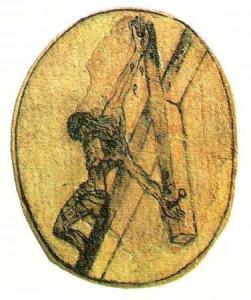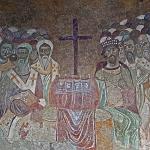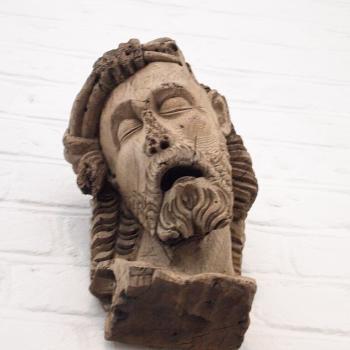
One of the most difficult elements of Christianity for us to understand, thanks to the way we have been led to think and consider ourselves as mere individuals in modern times, is the way Jesus, the incarnate God-man, is said to have made atonement for our sins. That is, we have a problem understanding his substitutionary atonement for us. It is not possible in a short space to properly respond to all the concerns people can and do bring up. However, it is possible to point to a particular framework which can and does help deal with the questions which can and do arise. That is, a brief response can be given which, if considered, should hopefully lead people to consider things on their own, to discern their own insights, and perhaps, give their own answers.
There are two types of questions Christians and non-Christians tend to ask about Christ’s atoning work. The first asks why, exactly, does God need to act in and through the incarnation, and with it the death of Jesus on the cross, in order to provide us forgiveness; can’t God just forgive us? The second asks, if God, for some good reason, wants us to deal with the consequences of our actions, especially, therefore, our sins, why would God send Jesus to do so in our place? That is, God wants us to make amends for what we have done, why, then, do we find God circumventing that by having Jesus make those amends for us?
The second question often arises due to the way Christianity answers the first question. God has given us free will, and God wants to preserve our freedom. It would be rendered meaningless if our actions do not have consequences, that is, if God comes in and instantly undermines any particularly negative consequence for our actions. Freedom comes with responsibility, and so, by giving us freedom, God also gives us a great responsibility. That responsibility includes more than just experiencing the “karmic” result of our action. It means we should also bear the burden of dealing with and fixing whatever harm we have caused thanks to our actions. God could have easily forgiven us, taking care of the harm which we have caused, but that would render our choices, our lives, meaningless because we would be shown to have no moral responsibility of our own. God could have made it that there would be no karmic-like response to bad choices, that we could cause harm in the world without being responsible for it, but that would have undermined all sense of justice in the world.
We bear responsibility for our actions and we should strive to make amends for whatever harm we have caused in the world. The problem is we often cannot fix what we have broken (as the nursery rhyme Humpty Dumpty indicates). This is not to say we should not try. We should do all that we can. But, in the end, we need help. We can’t heal all the wounds we have caused. We can’t fix the world all by ourselves. Thankfully, we are not in this world all by ourselves. We are in this together. We often can and do help each other with our particular skills and abilities. What one of us cannot do by ourselves, we can with the help of another. Contrary to what modern individualism suggests, our existence in the world is of an interdependent relationship with each other (and the rest of creation). What one person does will not only affect themselves, but will have an effect on everyone. This is why we can help each other, because we are interdependent; we are not monads out of reach from each other. Similarly, then, as we are interdependent with each other, we form a whole together, and through this, we actually bear the responsibility of making amends for what humanity, as a collective whole, has done wrong. Despite how much we have divided ourselves from each other, trying to set ourselves up as independent individuals, we are never going to be completely independent; we are persons in relation with each other, sharing a common heritage, a common nature, and we bear the burdens of each other thanks to our connections with each other.
Because we share in a common nature, we share with each other the burden of what humanity has done in and to the world (as exemplified by the notion of original sin). Similarly, what one person does in which serves to benefit the world, can and will provide something of positive value for the whole of humanity as well. We benefit from the good which we all do, even as we suffer from the evil which we all do. This line of thought leads us to the best way to engage and understand Christ’s “atoning sacrifice.” Jesus, the God-man, assumed human nature, and in doing so, shared with the rest of us our burdens, our responsibilities. He was able to take upon himself all that we cannot do, and thanks to the fact he is also a divine person, he is able do it for us. He wants us to share in the work, to cooperate with him, and so make amends the best we can, but then he offers the grace which we need to supplement and perfect our actions, to fulfill what we cannot fulfill ourselves. This is how he was able to take upon himself all the consequences of sin and bring them to their proper end. That accomplishment is represented to us in his resurrection from the dead; sin, and the consequences of sin, are shown to be transcended by him, and we are called to share in that transcendence in the eschatological resurrection from the dead. Thus, as Walter Kasper explains:
The idea of substitutionary atonement can be understood only in the context of this corporate understanding. On the basis of this common entanglement in sin and common subjection to death, no individual can brag about being able to pull him- or herself out of the morass with his or her own two hands. First and foremost, as mere mortals we are not able to restore life by our own power. [1]
This, then, provides the insight we need to understand the idea of substitutionary atonement. It is not that Jesus merely does something in our place, as if there were no connection between him and us. Rather, we must understand Jesus, in assuming human nature, takes on the common heritage and burden of humanity. The actions and value of human history is affirmed, and it is affirmed in the greatest way possible, as it is assumed by the divine person of God-the Son as he unites himself with us, taking the human condition upon himself and making it and its one with his person. And in doing so, he connects us with himself, allowing us to become one with him, so that his actions become, therefore, the actions of humanity, just as much as ours are; his work becomes our work, even as our work and actions, and feelings, become a part of his own person. Indeed, through our unity with him, our words and feelings can be transferred to him and spoken by him, which is one way to understand some of the words he spoke while on the cross:
Hence it is that our Head, the Lord Jesus Christ, transforming all the members of his body into himself, cried out amid the punishment of the cross (assuming the persona of those redeemed), saying what on one occasion he had uttered in the psalm: “My God, My God, look at me. Why have you abandoned me?” This expression, dearly beloved, represents a teaching, not a complaint. [2]
Thus, the key to understanding the atoning sacrifice, the key to understanding how Jesus can make satisfaction on our behalf, is interdependence. We are not entirely separated from each other. Rather, everyone, indeed, everything in creation, is interdependent with each other, and through that interdependence, form one collective whole, one participated unity. It is a participated unity because it does not undermine the relative distinctions found in it, including, and especially, the personal distinctions of subjects found within that whole. That is, the unity of creation must not be understood as some sort of monistic unity which reduces everything and everyone down to one by annihilating all distinctions. With that as the foundation, we should understand the atonement better. The incarnation provides a way for God to help humanity, to engage the burdens of humanity, to offer grace, without subverting the value of creation itself because God does not do so in any way which renders our freedom meaningless. God wants to preserve our freedom, and with it, the freedom to act in such a way that our actions have meaning and significance. God works with humanity to make amends for what humanity has done together in the world, for the bad decisions and bad actions which we have taken upon ourselves throughout history. Our freedom, therefore, is not only preserved, but the responsibility which comes from it is not undermined, but rather, reinforced by the incarnation, even as we are provided a way by which we can truly repair the harm which we have caused instead of suffering unending trials and tribulations trying to fix which we cannot fix on our own.
To give our lives meaning by making our actions have real impact in the way they shape history and the world around us is important. But it is also important that we are given the opportunity to make amends and make reparations for whatever harm we cause to others (or even ourselves). It is fitting, then, that with the assumption of humanity, the God-man, Jesus, is able to fulfill our responsibility for us, that is, confirm that what justice expects of us as a whole can and will be fulfilled by us. God joins in and acts in and with us, as a human, the whole of human history, indeed, due to the interdependent nature of humanity with creation, the whole of created history. He makes amends as one of us, not because God is angry and wants to punish us for our sins, but because God loves us and wants the best for us, including, the preservation of our freedom while also having a way to make reparations for that freedom itself.
[1] Walter Kasper, Mercy. Trans. William Madges (New York: Paulist Press, 2013), 74.
[2] St Leo the Great, Sermons. Trans. Jane Patricia Freeland CSJB and Agnes Josephine Conway SSJ (Washington, DC: CUA Press, 1996), 295 [Sermon 67].
Stay in touch! Like A Little Bit of Nothing on Facebook.
If you liked what you read, please consider sharing it with your friends and family!
N.B.: While I read comments to moderate them, I rarely respond to them. If I don’t respond to your comment directly, don’t assume I am unthankful for it. I appreciate it. But I want readers to feel free to ask questions, and hopefully, dialogue with each other. I have shared what I wanted to say, though some responses will get a brief reply by me, or, if I find it interesting and something I can engage fully, as the foundation for another post. I have had many posts inspired or improved upon thanks to my readers.












